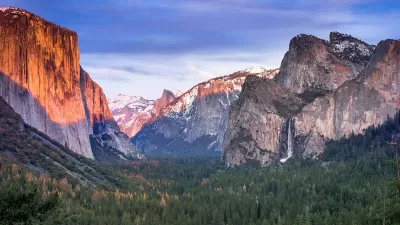The biggest threat to California's cap-and-trade program, a critical component of the state's comprehensive effort to reduce greenhouse gas emissions, may not come from the Trump Administration but from a lawsuit heard in Sacramento on January 24.
Are the permits that California companies are required to buy in order to release carbon dioxide a fee or a tax? If the latter, the program is unconstitutional under state law that requires taxes to be approved by a two-thirds majority. The case was heard by the California 3rd District Court of Appeal. Judges have 90 days to issue a decision.
"For Gov. Jerry Brown and the environmental community, the lawsuit has been a ticking time bomb that could eliminate a key source of revenue and undermine a program touted as an international model for fighting global warming," reports Chris Megerian for the Los Angeles Times.
Tony François with the Pacific Legal Foundation, which represents the The Morning Star Company, a tomato ingredient processor that falls under the cap-and-trade regulations, as well other businesses in the lawsuit, "says the permits amount to an illegal tax," writes Amy Quinton, environment reporter for Capital Public Radio in Sacramento. "So far, the cap-and-trade auctions have raised $4.4 billion." Audio by Quinton is also available for this article
"Cap and trade was devised by the California Air Resources Board to meet emissions-reduction goals set by lawmakers in 2006, and the first permits were auctioned off in 2012, reports Chris Megerian for the Los Angeles Times. "However, the original legislation wasn’t passed with a two-thirds vote, the legal threshold for raising tax revenue."
"In an initial ruling in 2013, the Sacramento Superior Court found for the state," notes the California Chamber of Commerce, the original plaintiff in the November 2012 case. "CalChamber appealed that decision to the 3rd District Court of Appeal."
"David Zonana, a deputy attorney general representing the Air Resources Board, defended the revenue by saying it’s being used to reduce greenhouse gas emissions..." and is thus a “legitimate regulatory tool," adds Megerian.
Zonana also said cap and trade isn’t a tax because buying pollution permits through a state auction isn’t required under the 2006 emissions-reduction law. Companies could also trade for the credits on a market, or modify their operations to lower emissions.
"Whatever the outcome, the case will likely head to the California Supreme Court," adds Quinton.
"Either way, the result will ripple outside the state’s borders as politicians around the world consider the best way to reduce greenhouse gas emissions," writes Megerian.
Legislation that passed last year extends California's landmark carbon reduction program from 2020 to to the year 2030, requiring emissions reductions of 40 percent below 1990 levels, but it did not include cap-and-trade. SB 32 passed with less than a two-thirds majority in both houses. Thus it's possible that regardless of the outcome of the lawsuit, unless legislation is passed, cap-and-trade ends in 2020.
Megerian reports that AB 151, introduced on Jan. 11, would continue the use of cap-and-trade to achieve the greenhouse gas reductions required by SB 32.
FULL STORY: Appeals Court Hears Challenge To California's Cap-And-Trade Program

Maui's Vacation Rental Debate Turns Ugly
Verbal attacks, misinformation campaigns and fistfights plague a high-stakes debate to convert thousands of vacation rentals into long-term housing.

Planetizen Federal Action Tracker
A weekly monitor of how Trump’s orders and actions are impacting planners and planning in America.

In Urban Planning, AI Prompting Could be the New Design Thinking
Creativity has long been key to great urban design. What if we see AI as our new creative partner?

King County Supportive Housing Program Offers Hope for Unhoused Residents
The county is taking a ‘Housing First’ approach that prioritizes getting people into housing, then offering wraparound supportive services.

Researchers Use AI to Get Clearer Picture of US Housing
Analysts are using artificial intelligence to supercharge their research by allowing them to comb through data faster. Though these AI tools can be error prone, they save time and housing researchers are optimistic about the future.

Making Shared Micromobility More Inclusive
Cities and shared mobility system operators can do more to include people with disabilities in planning and operations, per a new report.
Urban Design for Planners 1: Software Tools
This six-course series explores essential urban design concepts using open source software and equips planners with the tools they need to participate fully in the urban design process.
Planning for Universal Design
Learn the tools for implementing Universal Design in planning regulations.
planning NEXT
Appalachian Highlands Housing Partners
Mpact (founded as Rail~Volution)
City of Camden Redevelopment Agency
City of Astoria
City of Portland
City of Laramie



























